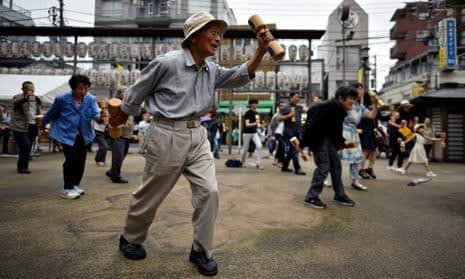The upside of living in Japan’s ageing society
For the first time more than 10 per cent of the Japanese population are aged 80 or older, according to new official data. This reinforces Japan’s reputation as the world’s oldest society with 29 per cent of the population now aged 65 or more, a full 5 per cent ahead of Italy in second place.
The evidence is there for all to see: walk around a typical Tokyo neighbourhood in the mid-afternoon and all you’ll see is old, often ancient people. You’ll think you wandered into a gated retirement community or an open air gathering of the Darby and Joan club.
The pandas in Tokyo zoo have been more prolific than the average Japanese youth
The new data adds yet more weight to the already abundant evidence of Japan’s frightening demographic challenges. The ageing population percentage is a result of greater longevity coupled with a declining birthrate – 2022 marked the fewest births on record for the country. It is estimated that, at current rates, the Japanese population will decline by about 50 million (from 126 million to 75 million) by 2100. As Elon Musk once observed, unless the population bomb is defused the Japanese may be extinct in a few centuries (you can actually watch the Japanese population shrinking in real time here, if that floats your boat).
The government has yet to respond to the figures but will no doubt point to the policies they have launched to arrest the ageing trend. So far we have been promised generous subsidies for child rearing and childcare, increased student loans, more flexible working patterns, greater paternity as well as maternity leave, and even free houses in the countryside, where space is plentiful. The language has been urgent – prime minister Fumio Kishida has talked of an ‘existential crisis’ and children’s policies minister Masanobu Ogura said Japan had a ‘last chance’ to save their society. But nothing has worked; the pandas in Tokyo zoo have been more prolific than the average Japanese youth.
There are many reasons for this but at the heart of the problem is the diminished options for young Japanese to find stable and secure employment. Thanks to the relaxation of labour laws in the 1990s, Japan’s lifetime employment system is no more. In the old days if you had a job with a big company you were virtually unsackable: even the incorrigibly useless would become ‘window men’ paid to sit at a desk and not disturb anyone. Now many struggle with short term contracts, low pay, long hours and often exploitative employers (so-called ‘black companies’). As a result, they find it hard to make themselves eligible or plan families even if they have the energy and will to do so.
Many Japanese appear not to: last year, a poll by the government-affiliated National Institute of Population and Social Security reported an 8-fold rise for men and a three-fold rise for women who said they had no intention of getting married when compared to the same survey in 1982. Many, it seems, have simply given up.
The government is certainly trying to address this but though companies may be advised to be more flexible, cut out the ‘service zangyo’ (unpaid overtime) and offer work from home options, longer holidays and more generous maternity/paternity leave, it seems that few actually will – even though some may promise to do so. That leaves mass immigration as the only viable solution but one that no political party has shown any sign of embracing.
However, it’s not all bad news. There are upsides to living in a gerontocracy. The new figures were released in a timely fashion just ahead of ‘Respect for the Aged’ day – a national holiday; but every day in Japan is respect for the aged day. The old and elderly are still deferred to here, treated with courtesy and assumed to be repositories of wisdom and humanity. And, encouragingly, old means something different here, starting at at least 75: the current prime minister at 66 is considered jejune by many.
There is more positivity about being old in Japan than anywhere else in the world. The elderly delight in doing un-elderly things and the media delight in reporting them. Recent stories include a 90-year-old wheelchair-bound pensioner who made it up Mount Fuji and the world’s oldest female beauty advisor (she’s 100) being recognized by the Guinness Book of World Records. She has no plans to retire. Meanwhile, Japan’s over-80s football league is, apparently, booming.
There are so many positive stories about the elderly that some slip through the net. Neither conductor Seiji Ozawa’s return to the podium last year (he’s 88) nor artist Yayoi Kusama’s recent shows (she’s 94) were deemed worthy of special comment.
The country is shaped around the old with facilities built and maintained with an aged clientele in mind. That means standards of cleanliness and service are high. And there is far less impulse for constant change or tolerance for youthful revolutionary fervor (Just Stop Oil protests would be unthinkable). There is less hysteria, more order, and such aspects of society that work perfectly well are left alone to continue to do so.
All of this makes Japan a pretty comfortable place to live for those of mature years. Dark demographic clouds may be clearly visible on the horizon but at least for the time being, Japan is a country for old men, and old women.
Read more @spectator











